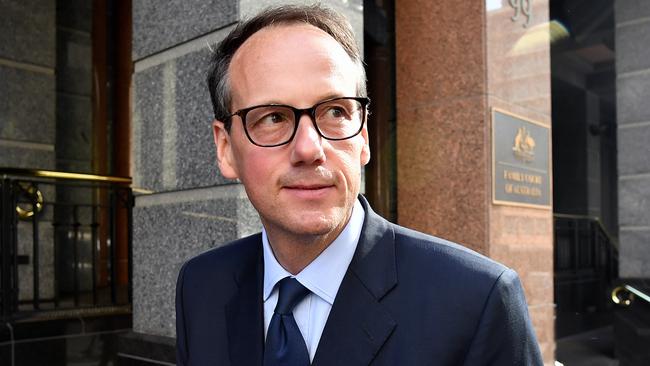
The concerns are at both ends of the spectrum, starting with those who can afford to pay their loans back and whether they should start doing so now, because otherwise they are just feeding easy money to the banks on extended loan terms.
At the other end are those who can’t afford to pay back the loans and just maybe the bank ought to take control of those loans today and declare them problem loans and work with the customers accordingly.
This comes at a cost to the banks, but it is far better for the customers to start the repair work immediately.
ASIC has made its concerns known to the banks.
Some lenders, such as Macquarie and Judo, are being singled out as doing the right thing by having the tough discussion with the customer now.
The big banks are caught in a political bind — they are trying to sell themselves as helping with the national recovery but are perhaps hurting customers in the process.
ASIC’s issue is just what is being said to customers at either end of the spectrum and in whose best interests the banks are acting.
The banks, it should be stressed, say hand on heart they are doing their best to help customers, but if 20 per cent of CBA’s deferral customers are paying back their loans, that means 80 per cent are not, which is a potential nightmare for the bank and their customers.
Qantas the canary in the coalmine
The corporate plod’s concern comes as the growing COVID-19 toll in Melbourne is raising growing concerns about the state of the national economy and Victoria in particularly.
This is best explained by Qantas — two weeks ago it raised $1.4bn at $3.65 a share and was looking at filling its schedule to 40 per cent, but today it will struggle to fill 25 per cent of the schedule.
The Melbourne-Sydney route is the second-busiest in the world, with 10 million flights a year, behind one in South Korea between Seoul and the holiday resort town of Jeju with 13 million flights.
The border closure clearly blocks off a big slice of Qantas’s earnings, which explains why its stock price closed down 2.9 per cent at $3.50, or 15c below the issue price.
The tourism sector is a standout candidate for continued support when the JobKeeper program runs out at the end of September.
The bank loan deferrals were also due to expire in September, but they have been extended until the end of the year, which raises another dilemma — if someone can’t pay their repayments for 10 months, have they any chance of recovery?
It also introduces another concern that Shipton is expected to raise next week — which is business interruption insurance, now subject to a UK test case from the UK Financial Conduct Authority.
The local Financial Complaints Authority has been flooded with complaints after insurance payouts were denied for business interruption insurance when the business was shut on government orders.
Some insurance policies exclude pandemics from claims, but this is based on an ancient Quarantine Act that has since been repealed.
The UK action, which includes QBE, will be a test case on the issue, including questions such as any difference between a business shut because of the pandemic and shut because the pandemic prompted the government to order a lockdown.
Many Melbourne bars and restaurants are facing the disaster double-closure feared only one month ago.
The hearings come as ASIC also doubled its efforts against short-term credit providers such as Cigno, which in one case turned a $350 loan in September last year into a $1200 debt in December due to the addition of a range of loan fees and default charges. The short-term loan was subject to ASIC’s first product banning intervention, which importantly can be lodged if the plod thinks the product is causing consumers significant harm.
It doesn’t have to prove a breach of the law.
Cigno is fighting the terms of the product order and this week ASIC lodged its second product banning order when Cigno rolled out its short-term loan to equally lucrative continuing credit terms.
The product banning powers are part of the corporate cop’s weapons as it moves away from the perceived failure of overreliance on disclosure as a regulator tool to demanding business designs and distributes products that meet the financial need, situation and objectives of their target market.
The D&D obligations is the new ASIC catchcry, but the politicians will be more concerned about regulatory competence.
Penn’s earnings test

Telstra boss Andy Penn is kicking goals on the ESG front, but the starting point for investors is still earnings growth delivered in a sustainable way.
That is what Penn is aiming for, and on a total return front he has outperformed the market by 3.5 per cent over 12 months and 41 per cent over two years.
This relativity measure includes dividends because, as noted in price terms, the stock closed on Friday at $3.48, well down from above $6 in 2014 just before Penn took the top job.
Earnings before interest and tax growth is not great, in part because he has had to send money to grow and, of course, he now has to cope with the NBN robbing him of monopoly rent on his fixed-line business.
UBS is tipping EBIT to be flat around $3.7bn in the 2020 financial year, falling a touch to $3.5bn in 2022.
But analyst Eric Choy is thinking its all-important dividends of around 16c a year are safe for the foreseeable future.
“That is also important for Telstra given as one naysayer puts it, ‘the company enjoys a parking lot benefit when the market gets wobbly and there is nowhere else to put your money’,” Choy says.
Penn this week declared the company was carbon neutral due in part to investments in offset schemes in Western Australia and Queensland, to burn savanna grasses more safely and reforestation projects.
Airlie Funds Management’s Matt Williams said: “You could argue companies went too far down the track of rewarding shareholders and there is no doubt that to be a sustainable business you need to meet the ESG hurdles.”
Next month’s earnings season will see whether Penn is producing on the earnings as well as the ESG front. He declared this week that the Milton Friedman claim a company’s sole purpose was delivering for shareholders was dead. The reality is for a company that doesn’t look after its customers and the community, its earnings sustainability will be questioned.







ASIC chairman James Shipton is expected to use next week’s appearance at a joint Parliamentary Committee hearing to express the corporate watchdog’s concerns about how banks are treating customer loan deferrals at a time when continued COVID-19 outbreaks further threaten the economy.